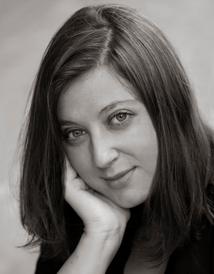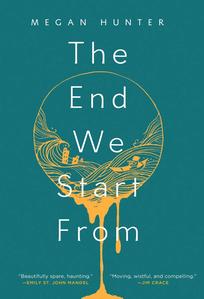
|
|
| photo: Alexander James | |
Megan Hunter was born in Manchester, England, in 1984, and now lives in Cambridge with her young family. She has a B.A. in English Literature from Sussex University, and an M.Phil. in English Literature: Criticism and Culture from Jesus College, Cambridge. Her poetry has been shortlisted for the Bridport Prize, and her short story "Selfing" was a finalist for the Aesthetica Creative Writing Award. Our review of her first novel, The End We Start From (Grove Press), is below.
Have you read much science (or speculative) fiction? Do you admire any SF writers in particular?
I often think that I haven't read much SF--I've not read Ursula Le Guin's work, for example, although I'd like to. But then I think of books I love such as The Handmaid's Tale, The Road, How I Live Now, Northern Lights, and of the loves of my childhood--Narnia featured heavily there, as did Jules Verne's Journey to the Centre of the Earth. I always remember that sense of the imaginative leap in those books--my favourite Narnia book was The Magician's Nephew, in which they travel to many different worlds and dimensions.
The language in this book is beautiful, but the characters themselves are nameless (except for the baby). They are also speechless; there is no directly reported dialogue. What led you to make these choices?
They didn't really feel like choices at the time, more like instinctive moves dictated by what seemed to be the demands of the form and voice of the book. Looking back, I think that the namelessness of the characters fits with the dual sense of the book as modern fable or parable, and as an intimate piece of writing to the self, as in a diary or notebook. Names wouldn't be needed or necessarily appropriate in either of these contexts. This way of looking at the book also works for dialogue--in a notebook (or fairy tale/parable) there wouldn't usually be large amounts of dialogue. The narrator is very much in her own head, and so speech with others is peripheral to her experience. She also has a wordless relationship with her baby for much of the book, and becomes very much rooted in her potent physical experiences. Much of the book consists, as I see it, of the narrator giving voice to wordless experience--and also leaving that experience to speak of itself, in the space and silence that surrounds each section.
Did you do any reading to support your writing, for research, form, musicality?
In terms of form, I was influenced by fragmentary works by writers including Anne Carson, Jenny Offill, Maggie Nelson and David Markson. These writers showed me that there was a way of writing in which I wouldn't feel that poetry and prose fiction were necessarily contrasting forms pulling in different directions--that I could bring my poet self together with my novel/fiction self. And in terms of musicality, my reading of all kinds of poetry was my main guide there. If a sentence didn't stand strongly enough in its own right, it was deleted, or at least edited heavily. In this way my process was similar to my experience of writing poetry--I was looking for a sense of the unexpected, for a certain playfulness with language.  How long did it take you to write this? How would you describe yourself as a self-editor?
How long did it take you to write this? How would you describe yourself as a self-editor?
The first draft came quite quickly--in around six months. I was editing as I went along, so there was minimal editing at first, and then a longer process with my agent and then my editors in the U.K. and the U.S.--probably around eight months altogether, through all the different stages. As a self-editor, at least in this book, I worked line by line, word by word, often playing with an individual sentence for days at a time. When I worked with editors, it was more looking at overall questions of character, plot, etc. And of adding things--I was fairly cautious at this point, reluctant to add too much to a text that seemed to have been formed in a single creative impulse/trance. Of course, it wasn't quite like that, and editing is always highly necessary. There were also some slightly comic episodes towards the end of the process involving my editor and I discussing single commas for substantial amounts of time!
What books mean the most to you?
Many are books I read as a teenager/young adult--often as an undergraduate. These include Frank O'Hara's poetry, Virginia Woolf (especially The Waves and Mrs. Dalloway), Jean Rhys's Wide Sargasso Sea, Marcel Proust's In Search of Lost Time, Zora Neale Hurson's Their Eyes Were Watching God, Angela Carter's Bloody Chamber and Ernest Bloch's The Principle of Hope. More recently, I have fallen head over heels with Birds of America and Who Will Run the Frog Hospital by Lorrie Moore--she blows me away with her humour and sensitivity. I also recently re-read The Bell Jar--it was even better than I remembered.
The baby and new mother in this book ring very true to life. New parenthood can be difficult to write about, since the exhaustion and distraction at the time can blur your memory. Did you take notes on your children and your own state of mind in their first months?
I've always written a journal/notebook, and I did jot down a few things when my children were babies, but I wasn't a particularly prolific recorder of the experience (compared to some people I know). But when my first child was a baby I did write down one line that is in the book word for word: "It seems that he is feeding me, filling me with a steady orange light." Also, just before I started writing the book we had a new baby in our extended family, and I think the experience of holding him worked as a kind of "madeleine" moment, taking me back to my own experiences six or seven years previously.
What did you learn from writing this book?
I learnt that I could write in a way that felt simultaneously closer and further from myself than anything I'd managed before. My mentor said, "It's like you've suddenly taken off," and it did feel like that. --Sara Catterall

